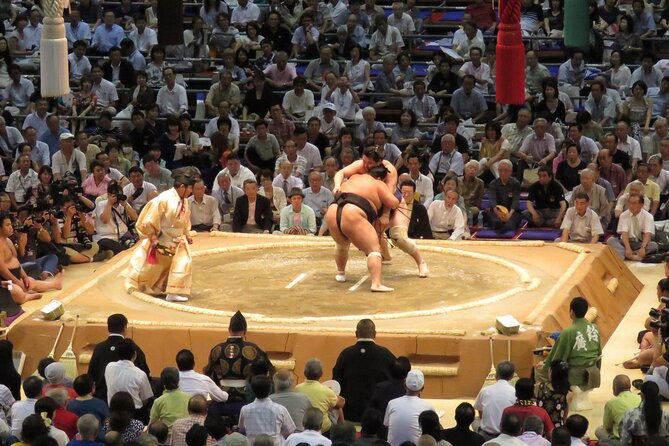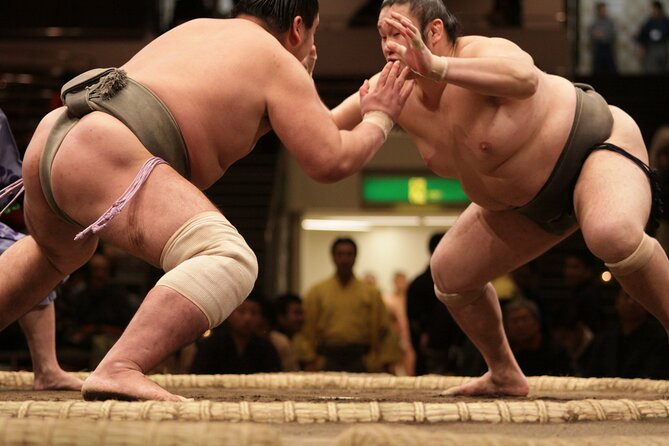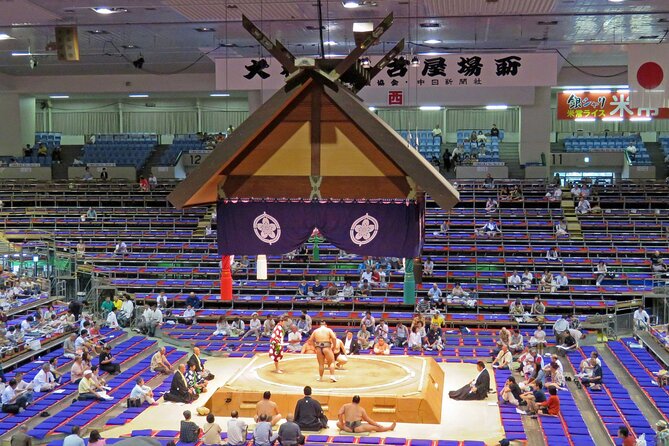The Sumo Tournament Experience in Fukuoka is a must-see event for sports enthusiasts and cultural aficionados alike. Visitors can choose from a range of options to witness the thrilling matches and enjoy the centuries-old tradition of sumo wrestling. Whether opting for a private tour with premium seating or a small group experience, attendees are guided by English-speaking experts who provide invaluable insights into the sport’s rich history and practices. The tournament promises an unforgettable glimpse into Japan’s enduring sporting heritage, leaving spectators eager to discover more about this captivating and revered national pastime.
Key Points

-
The Sumo Tournament in Fukuoka occurs in November, featuring top-ranked wrestlers in fierce competition and providing insight into Japan’s cultural traditions.
-
Visitors can choose between private tours with premium seating or standard join-in small group tours, both led by English-speaking sumo experts.
-
Meal options, such as chanko hot pot, sukiyaki, or vegetarian, are available but not included unless selected.
-
The event is wheelchair accessible, but seats on the second floor require stair climbing.
-
Reservations are recommended at least 3 months in advance, and cancellation may incur a service fee.
Choosing Your Sumo Tournament Experience

There are two main options for experiencing a sumo tournament in Japan: a private tour with premium seating or a standard join-in small group tour.
Private tours offer A-class or B-class reserved seats, while standard tours provide B-class or C-class seating. Both tours include an English-speaking sumo expert guide.
Dinner options like chanko hot pot, sukiyaki, or vegetarian are available, but meals aren’t included unless the dinner option is selected.
Sumo tournaments occur six times a year, and tour group sizes are limited to 20 people maximum per guide.
You can also read our reviews of more tours and experiences in Fukuoka.
Sumo Tournament Schedule and Locations
Official sumo tournaments, known as basho, take place six times a year, each lasting 15 days.
The schedule includes events in Tokyo (January, May, September), Osaka (March), Nagoya (July), and Fukuoka (November).
Tournament dates may vary annually but occur during the same months.
These grand tournaments are the pinnacle of the sumo calendar, featuring the top-ranked wrestlers in fierce competition.
Fans from around the world flock to these events to witness the raw power, skill, and tradition of the ancient Japanese sport.
Accessibility and Participation Considerations

Although most travelers can participate in the sumo tournament experience, there are a few accessibility considerations to keep in mind.
The event is wheelchair accessible, with storage available on the first floor. However, the seats on the second floor require stair climbing.
Children are welcome but must be accompanied by an adult. There’s no age requirement for pricing.
Guests should notify the organizers in advance about any accessibility needs.
Taking in Sumo Culture and Cuisine
As one of the most storied and revered sports in Japan, sumo wrestling is deeply rooted in the country’s cultural traditions.
Sumo wrestlers live in communal training stables (heya) where their daily lives are closely monitored. They follow a strict regimen of training, eating, and resting, with the staple meal being chanko nabe – a hearty stew made with chicken stock and various vegetables.
Spectators at a sumo tournament can enjoy this rich cultural experience, watching the wrestlers engage in their age-old rituals and rituals before and during the matches.
Booking and Cancellation Policies
Reservations for a sumo tournament experience are recommended at least 3 months in advance, with a minimum of 1 month required.
Group tickets are typically released 4-7 weeks before the event. If tickets are unavailable, alternative dates or refunds may be offered.
Cancellation may result in a service fee if planning has begun, and reservations are non-refundable after booking.
Guests must arrive 10 minutes before the meet-up time, as late arrivals may miss the tour.
Sumo tournaments are popular, so early booking is essential to secure seats and plan accordingly.
- Fukuoka Airport (Fuk): Private Transfer To/From Kumamoto
- Fukuoka(Fuk)Airport: Private Transfer To/From Kurokawa Onsen
- Fukuoka: Japan / Asia Esim Roaming Mobile Data Plan
- Fukuoka Airport(Fuk): Private Transfer To/From Yufuyin Onsen
- Fukuoka Airport (FUK): Transfer to Fukuoka (Port Hakata)
- Fukuoka Full-Day Private Tour With Government Licensed Guide
What to Expect on the Day of the Tournament
What can travelers expect on the day of a sumo tournament? The day is filled with excitement and immersion in Japanese sumo culture.
Attendees can:
- Observe the pre-match rituals and ceremonies, including the sacred salt-throwing ritual.
- Witness the intense, fast-paced matches as sumo wrestlers battle it out in the ring.
- Explore the tournament venue and soak in the lively atmosphere, with food vendors, merchandise stalls, and opportunities to interact with sumo fans.
The sumo tournament experience offers a glimpse into this centuries-old tradition, providing a unique cultural insight for visitors to Japan.
Enhancing Your Sumo Experience
To make the most of your sumo tournament experience, there are several ways travelers can enhance their enjoyment and understanding of this captivating Japanese tradition.
Opt for a private tour to secure the best seats and personalized guidance from a local sumo expert. Consider upgrading to the dinner package, where you’ll savor the hearty and nutritious chanko nabe stew enjoyed by the wrestlers.
For a deeper dive into sumo culture, visit a stable to observe the athletes’ rigorous training routines and daily rituals.
With these enriching additions, you’ll learn about the spirit of this ancient sport.
Making the Most of Your Sumo Tournament Visit
Attending a sumo tournament presents a unique opportunity to take in Japan’s rich cultural heritage.
To make the most of your visit, consider the following:
-
Explore the pre-match rituals and ceremonies, providing a glimpse into the sport’s centuries-old traditions.
-
Indulge in the signature chanko nabe stew, a hearty dish that fuels the wrestlers’ intense training.
-
Engage with the knowledgeable tour guide, who can offer insights into the intricacies of the matches and the wrestlers’ lifestyles.
With careful planning and an open mind, you can truly experience the captivating world of sumo wrestling.
Frequently Asked Questions
How Do I Book the Best Seats for the Sumo Tournament?
To book the best seats for the sumo tournament, travelers can opt for a private tour with A-class or B-class reserved seating. Alternatively, they can choose a standard join-in small group tour with B-class or C-class reserved seats.
Can I Buy Souvenirs at the Sumo Tournament Venue?
Yes, visitors can purchase souvenirs and merchandise at the sumo tournament venue. There are numerous shops and stalls selling a variety of traditional items, such as wrestler figurines, towels, and other sumo-related memorabilia.
Is Photography Allowed During the Sumo Matches?
Photography is generally allowed during sumo matches, but flash photography is prohibited as it can distract the wrestlers. Spectators are advised to be respectful and follow the venue’s photography guidelines to ensure an enjoyable experience for all.
Can I Interact With the Sumo Wrestlers After the Tournament?
Guests are generally not allowed to interact directly with sumo wrestlers after the tournament. The wrestlers maintain a strict disciplined lifestyle and have limited interactions with spectators to preserve the traditional culture and respect of the sport.
What Should I Wear to the Sumo Tournament?
Casual, comfortable clothing is recommended for attending a sumo tournament. Avoid overly formal or revealing attire. Opt for layers, as venues can be cool, and be prepared to remove shoes when entering the seating area.
The Sum Up
The Sumo Tournament Experience in Fukuoka offers an exceptional opportunity to witness the ancient Japanese sport of sumo wrestling. Whether attendees choose a private tour or a small group tour, they’ll be guided by an expert and immersed in the rich culture surrounding the sport. From thrilling matches to authentic chanko hot pot, this event promises an unforgettable glimpse into Japan’s sporting heritage.
More Tour Reviews in Fukuoka
- Fukuoka Tour: Sacred Island of Munakata and Heritage Sites!
- Kyushu 9-Hour Chartered Day Trip| Fukuoka
- Fukuoka: Itoshima, Angels Wings, & Sake Brewery Private Tour
- Customizable Walking Tour With Ramen Tasting and Local Guide
- Fukuoka Tour: Demon Slayer-Inspired With Shrine Visits
- Fukuoka Private Custom Tour With Local Guide
Not for you? Here's more things to do in Fukuoka we have recnetly reviewed
- 3 Best Shopping Tours In Fukuoka
- 4 Best Full-Day Tours In Fukuoka
- 23 Best Cruises And Boat Tours In Fukuoka
- 7 Best Food Tours In Fukuoka
- 8-Day ONE WAY Bus Tour to Fukuoka From Osaka via SHIKOKU
- 6-Day Private Tour to Kyoto via Fukui From Fukuoka With Bus
- 5-Day ONE WAY Bus to North Hyogo From Fukuoka to Hiroshima
- 3 Day ONE-WAY BUS Tours to Fukuoka From Osaka via SANYO
- 3-Day ONE WAY Bus Tour to Hiroshima via SANIN From Fukuoka
- 3 Day One-Way Tour to Osaka From Fukuoka via SANYO With Bus
- *Stay at Beppu, 2-Day Bus Tour to Takachiho From Fukuoka
- Day Trip Bus Tour From Fukuoka to Tunoshima, Yamaguchi
